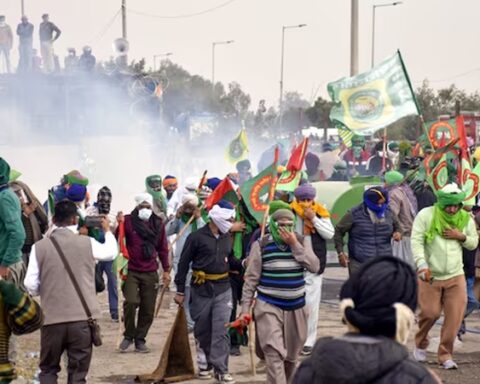SHAMBHU, India, Feb 23 (Reuters) – Thousands of protesting Indian farmers facing off with security forces have come under the protection of the Nihang Sikhs, a warrior sect dating back to the 1600s distinguished by their ink-blue robes and ancient weapons such as swords and spears.
The farmers, who are also mainly Sikhs and who hail from the northern state of Punjab, are demanding higher prices for their crops, and began marching to the capital Delhi earlier this month to press their demands to the government.
Police, however, have stopped the march about 200 km (125 miles) from the capital, using water cannons and tear gas to disrupt the demonstration.
On Wednesday, the farmers said they would stop their protest for two days after one of the demonstrators died. Police officers confirmed the man died at a protest site but added the cause of his death would only be determined by an autopsy.
As they waited for the march to resume, the Nihang warriors honed their skills by practicing fencing, horseback riding and meditating.
Easily distinguishable by their flowing robes and matching turbans, several Nihangs say they joined the march to “protect” the farmers.
“Guru Gobind Singh has preached that Sikhs must always be ready to fight injustice and oppression,” said Sher Singh, one of the Nihangs referring to the spiritual leader of the Sikhs.
“We have to be prepared if these protesters face any trouble even in the middle of the night.”
India’s minority Sikh community makes for more than half of Punjab’s 30 million population, and the Nihangs took part in a similar, year-long farmers’ protest in 2021.
“Farmers are being oppressed…The government must not think that they can scare the farmers away…this is Punjab and we are standing in solidarity with the farmers,” said Raja Ram Singh, another Nihang.
During the 2021 march, three Nihangs were arrested in connection with the murder of a Sikh man at one of the protest sites who they accused of desecrating Sikh holy texts, according to local media reports.
The Nihangs did not deny the allegations, maintaining that the man had committed sacrilege by attacking their holy book, the media reports added.


